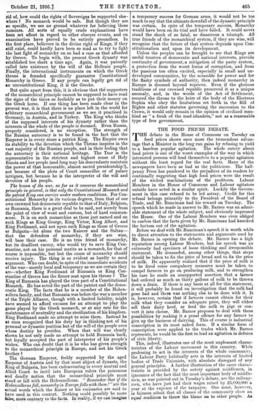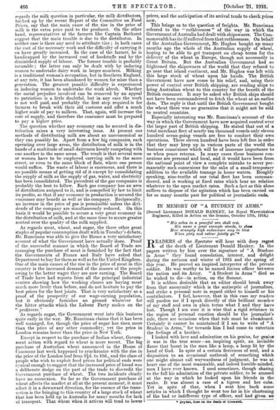THE FOOD PRICES DEBATE. T HE debate in the House of
Commons on Tuesday on food prices shows once more the tremendous advan- tage that a Minister in the long run gains by refusing to yield to a baseless popular agitation. The whole outcry about food prices is one of the worst examples of the way in which interested persons will lend themselves to a popular agitation without the least regard for the real facts. Many of the newspapers have been as bad as the politicians. The half- penny Press has pandered to the prejudices of its readers by continually suggesting that high food prices were the result of the wicked machinations of the profiteers. Labour Members in the House of Commons and Labour agitators outside have acted in a similar spirit. Luckily the Govern- ment in this case refused to be led astray. Credit for this refusal belongs primarily to the President of the Board of Trade, and Mr. Runciman had his reward on Tuesday. The speech which he made in answer to Mr. Barnes was an admir- able statement of the whole subject, and obviously impressed the House. One of the Labour Members was even obliged to confess that the facts given by Mr. Runciman had knocked the bottom out of the agitation.
Before we deal with Mr. Runciman's speech it is worth while to direct attention to the statements and arguments used by Mr. Barnes in opening the debate. Mr. Barnes has a high reputation among Labour Members, but his speech was an extremely bad specimen of loose thinking and irresponsible statement. He demanded, among other things, that steps should be taken to fix the price of bread and to fix the price of milk. He apparently realized that if the price of milk is to be fixed some compulsory measures must be taken to compel farmers to go on producing milk, and to strengthen his case he made an unsupported assertion that a farmer had ordered as much as thirty gallons of milk to be thrown down a drain. If there is any basis at all for this statement, it will probably be found on investigation that the milk had gone bad and there was nothing else to be done with it. It is, however, certain that if farmers cannot obtain for their milk what they consider an adequate price, they will either sell their dairy herd, or feed the milk to pigs or con- vert it into cheese. Mr. Barnes proposes to deal with these possibilities by making it a penal offence for any farmer to give up the business of dairymg. This of course is industrial conscription in its most naked form. If a similar form of conscription were applied to the trades which Mr. Barnes represents, he would be the first to lead an agitation in defence of civic liberty. This, indeed, illustrates one of the most unpleasant charac- teristics of the Labour movement in this country. While professing to act in the interests of the whole community, the Labour Party habitually acts in the interests of limited bodies of Trade Unionists, with absolute disregard of any general principles. A further illustration of the same charac- teristic is provided by the outcry against middlemen, in ignorance of the fact that the most important body of middle- men, as was pointed out in Tuesday's debate, are the railway- men, who have just had their wages raised by £5,000,000 a year at the expense of the taxpayer. One must, however, in fairness admit that all classes of the community show an equal readiness to throw the blame on to other people. As regards the milk question in particular, the milk distributors, backed up by the recent Report of the Committee on Food Prices, say that the main cause of the rise in the price of milk is the extra price paid to the producer. On the other hand, representatives of the farmers like Captain Bathurst suggest that the main trouble is due to the distributor. In neither case is there any need to attribute vice ; in both cases the cost of the necessary work and the difficulty of carrying it on have greatly increased. In the case of the farmer, he is handicapped by the increased cost of foodstuffs and by the diminished supply of labour. The former trouble is probably incurable ; the latter can only be dealt with by inducing women to undertake dairy work in larger numbers. Milking is a traditional woman's occupation, but in Southern England, at any rate, it has been abandoned by women for more than a generation. The greatest possible difficulty is experienced in inducing women to undertake the work afresh. Whether the social prejudice involved can be removed by an appeal to patriotism is a little doubtful, but in any case the work is not well paid, and probably the first step required is for farmers to break with their old customs and offer a much higher scale of pay to milkers. That, again, will increase the cost of supply, and therefore the consumer must be prepared to pay a higher price.
- The question whether any economy can be secured in dis- tribution raises a very interesting issue. At present our methods of distributing milk are about as uneconomical as they can possibly be. Apart from a few big companies, each operating over large areas, the distribution of milk is in the hands of a multitude of small dairymen keenly competing with one another in the same areas. The result is that several men or women have to be employed carrying milk to the same street, or even to the same block of flats, where one person would suffice. The waste of labour is enormous, and there is no possible means of getting rid of it except by consolidating the supply of milk as the supply of gas, water, and electricity has been consolidated. The precedent of the gas companies is probably the best to follow. Each gas company has an area of distribution assigned to it, and is compelled by law to limit its profits, so that if any economy in production is secured the consumer may benefit as well as the company. Reciprocally, no increase in the price of gas is permissible unless the divi- dends of the company are simultaneously reduced. On this basis it would be possible to secure a very great economy in the distribution of milk, and at the same time to secure greater control over the quality of the milk supplied.
As regards meat, wheat, and sugar, the three other great staples of popular consumption dealt with in Tuesday's debate, Mr. Runciman was able to give the House a very satisfactory account of what the Government have actually done. Proof of the successful manner in which the Board of Trade are managing the purchase of meat is furnished by the fact that the Governments of France and Italy have asked that Department to buy for them as well as for the United Kingdom. One of the main causes of the rise in the price of meat in this country is the increased demand of the masses of the people owing to the better wages they are now earning. The Board of Trade have had reports from all the principal industrial centres showing how the working classes are buying meat much more freely than before, and do not hesitate to pay the best prices for the best joints. That is very satisfactory as a proof of the prosperity of our wage-earning population, but it obviously furnishes no ground whatever for the bitter attacks which the Labour Party makes on the " profiteers." As regards sugar, the Government went into this business quite early in the war. Mr. Runeiman claims that it has been well managed, for, though the price of sugar has risen more than the price of any other commodity, yet the price in London remains lower than the price in New York.
Except in respect to the purchase of Indian wheat, Govern- ment action with regard to wheat is more recent. The big purchase of Australian wheat announced in the House of Commons last week happened to synchronize with the rise in the price of the London loaf from 9P. to 10d., and the class of people who wish to exploit food prices for political ends were cynical enough to suggest that the increased price of bread was a deliberate dodge on the part of the trade to discredit the Government purchase of wheat. The two incidents clearly have no connexion. So far as the Government purchase of wheat affects the market at all at the present moment, it must affect it in a downward direction, for the essence of the trans- action is the bringing to this country of a large stock of wheat that has been held up in Australia for many months for lack of transport. That wheat when it arrives will tend to lower prices, and the anticipation of its arrival tends to check prima now.
This brings us to the question of freights. Mr. Runciman ,referred to the " ruthlessness " of the way in which the Government of Australia had dealt with shipowners. The Com- monwealth has itself suffered from that ruthlessness. On behalf of the Australian Government, Mr. Hughes bought up many months ago the whole of the Australian supply of wheat, hoping to be able to get transport on cheap terms for the delivery of the wheat in Europe, though not necessarily in Great Britain. But the Australian Government had so frightened the shipowners of the world that they refused to go near that island continent, and. Mr. Hughes was left with this large stock of wheat upon his hands. The British Government have now come to his relief, and, using their power of control over British shipping, are sending ships to bring Australian wheat to this country for the benefit of the British consumer. It may be asked why British ships should not have been commandeered to fetch the wheat at an earlier date. The reply is that until the British Government bought the wheat there -was no guarantee that -it might not be sold to neutral countries.
Especially interesting was Mr. Runciman's account of the way in which the Government have now acquired control over the larger part of British shipping. He stated that out of a total merchant fleet of nearly ten thousand vessels only eleven hundred ocean-going vessels are free to conduct their own operations. These eleven hundred have been left free in order that they may keep up in various parts of the world the business connexions -which will be of immense importance to us when peace returns. In many cases these business con- nexions are personal and local, and it would have been from the national point of view a complete mistake to sever .per- manently such connexions for the sake of a small- temporary addition to the available tonnage in home waters. Roughly speaking, nine-tenths of our total fleet has been comman- deered, and is working at fixed rates which bear no relation whatever to the open market rates. Such a fact as this alone suffices to dispose of the agitation which has been carried on for so many months past or political or journalistic ends.



































 Previous page
Previous page